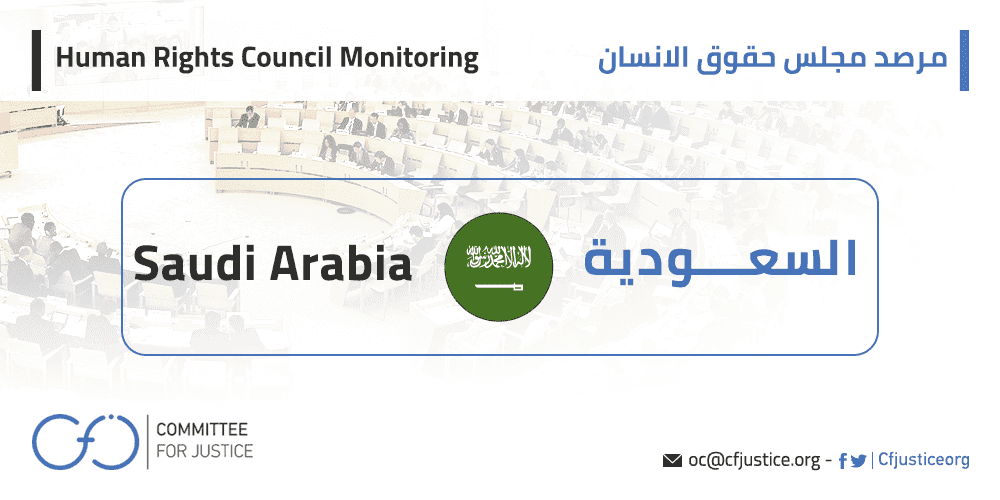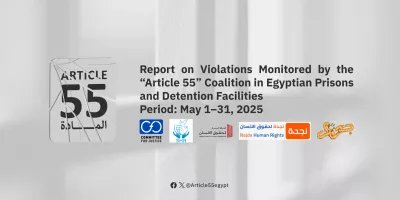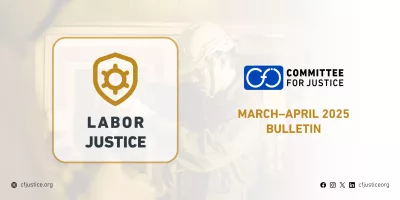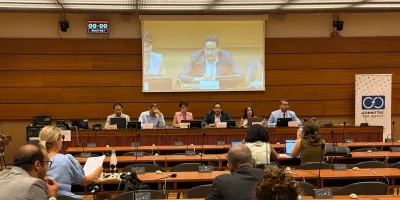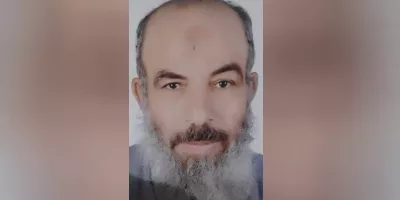News briefing
Translated and edited by: Committee for Justice
Geneva: October 26, 2021
UN experts have expressed their concerns about the execution of two Saudi citizens, one of whom is from the Shia minority, amid calls to halt their execution and to launch a retrial for them in accordance with internationally recognized fair trial standards.
In a memorandum sent to the Saudi authorities on August 27, 2021, regarding the cases of Mohammed Al-Shakhouri and Asaad Makki Shubbar, the latter a member of the Shia minority in Saudi Arabia, who were sentenced to death after trials that did not meet due process guarantees, and for crimes that did not appear to meet the “most serious” crimes” as required by international law.
The case of Mohammed Al-Shakhouri:
Mohammed Al-Shakhouri, born in 1984, disappeared on April 17, 2017, only to learn afterwards that he was arrested without witnesses or knowing where he was detained, although he was officially arrested at one of the checkpoints around Qatif and Awamiya.
On April 21, 2017, he was taken to his family’s home in chains, where the home was searched and several belongings were confiscated. No information was provided after this visit about his whereabouts or the reasons for his arrest, and his family were not allowed to appoint a lawyer to communicate with him. Five months later, people associated with him were told that he was being held in the Mabahith prison in Riyadh, but they were not allowed to see him.
He was held in solitary confinement for 3 months, during which he was subjected to the most severe forms of torture. He was denied access to the prison doctor for the first year of his detention, and he was not provided with any medication. In October 2017, his relatives were able to visit him for 30 minutes in Dammam Investigation Prison, and immediately after the visit, communications were cut off.
On July 11, 2019, the Public Prosecutor submitted a list of the charges against him and demanded his execution, the charges included: Joining a terrorist party “Hezbollah al-Hijaz”, Seeking to destabilize the social fabric and national cohesion, advocating, participating and promoting sit-ins and demonstrations that affect the stability of the Kingdom, financing terrorism, receiving training on how to use grenades and how to make explosives, possession of weapons and ammunition, possession of a microSD memory card and installing therein pictures of information of the “terrorist Hezbollah party.”
On January 12, 2019, the court appointed a lawyer for Al-Shakhouri, this was the first time he had obtained legal representation during his kidnapping, arrest and detention. On February 21, 2021, the trial judge sentenced Al-Shakhouri to death because of the charges brought against him collectively. On August 2, 2021, the death sentence was confirmed on appeal, and the case is now pending before the Supreme Court.
The case of Asaad Makki Shubbar:
Asaad Makki Shubbar, born in 1984, from the Shia minority in the Aseer region, he was arrested on April 28, 2017, and since his arrest until May 2019 (more than two years) he was held without trial and subjected to various types of torture, and Shubbar was held in solitary confinement for four months, and he was forced to sign written confessions by the investigating authorities.
The Specialized Criminal Court held the first session of his case in May 2019, and the Public Prosecutor brought several charges against him, including: Joining an armed terrorist organization, joining a group of Qatif residents in acts of sabotage, participating in demonstrations, chanting slogans and calling for participation in demonstrations and sit-ins, supporting a party classified as a terrorist organization, training on how to dismantle and install weapons.
During the trial, Shubbar denied the charges against him, and indicated that he was forced to sign confessions as a result of torture, and requested an investigation, including examining security camera footage of the interrogation, but this request was not granted. In January 2021, Shubbar was sentenced to death on the charges brought against him collectively. In July 2021, the Specialized Appeal Court upheld his sentence, and the case is now pending before the Supreme Court.
UN concerns about trials:
The experts expressed their deep concern about the reported death sentences against Al-Shakhouri and Shubbar on the basis of what appeared to be confessions obtained through torture, and that the judicial authorities’ use of those confessions as evidence of guilt constitutes a flagrant violation of due process and fair trial guarantees.
The experts also expressed their concerns about the lack of investigation into the enforced disappearance and torture they were subjected to, although these allegations appeared to have been reported to the trial judge, and that, if confirmed, these allegations amounted to a violation of the right to life, liberty and security.
The experts urged the Saudi authorities to halt the execution of Al-Shakhouri and Shubbar, to start a retrial for them, and to take all steps to address any allegations of enforced disappearance, torture, arbitrary detention and fair trial violations.
UN demands from the Saudi authorities:
The experts requested the Saudi authorities to provide detailed information on the factual and legal grounds for the arrest, detention and trial of Al-Shakhouri and Shubbar and to provide detailed information on any investigation that has been carried out into the allegations of enforced disappearance, torture and/or other cruel, inhuman or degrading treatment or punishment and arbitrary detention reportedly suffered by Al-Shakhouri and Shubbar, with a view to ensure accountability of those responsible.
The experts also called on the Saudi authorities to determine how the terrorism-related charges comply with the principles of legal certainty, and are consistent with the counter-terrorism legal framework contained in UNSCR 1373 and FATF Recommendations 8.

